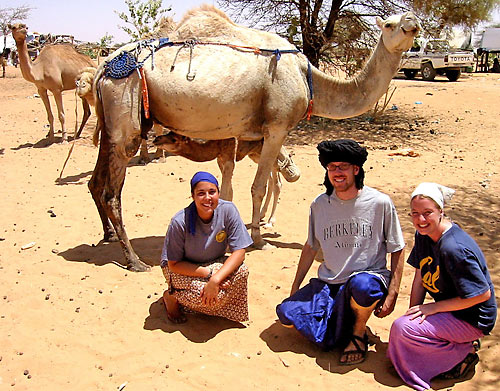What Color Is Your Thumb?
=== What Color Is My Thumb? ===
As children growing up in Alameda, California, my sister Angela and I had two competing gardens. They were just off the garage of our red brick house. I remember that period of my life partly because of our awesome cars: a bronze four door Volkswagen Dascher and a green Camero with a 350 cubic inch V8 engine and no air conditioning!
But back to gardening. I don’t remember my plot very clearly except for the pumpkin plants snaking around my plot with their bright orange mutant gourds. If anything successfully grew there, it was because my mother did the work for me. My mother’s thumb is unquestionably green.
Yesterday, with the generous help of Caleb (agro-forestry volunteer in my region) I started on my first Mauritania garden, and this time around I don’t have my mother here to do my bidding, or my weeding.. Caleb’s grand design calls for a two meter square plot, hemmed in with four wooden boards and poles on each corner for stability and shade/wind cloth support if needed. It’s good to have him around because he knows his stuff. I’ll be starting out with tomatoes, cucumbers, zucchini, pole beans, and cantaloupe, seeds courtesy of the U.S. Postal Service (thanks Mom!).
After spending about seven bucks on pick-axe to break through the rocky soil (or more accurately, the soily rocks), Caleb took a healthy back swing and cracked the darn thing in half on the first try. We’ll try again today with a stronger pole. And lucky for us, a family of cows seems to have moved in next door, so we shoveled a few buckets of cow pies for our soil mixture. It’s hard work in the Mauritanian sun, so we’ll try mostly in the mornings and evenings, with plenty of breaks for iced tea!
=== Bring in the next witness, please ==="Luke, I like your newsletter, but it's not long enough." I hear this ALL the time from my readers. However, I'm extremely busy with my Ramadan "Nap All Day" campaign" so I will offer you a compromise. My site mates have GREAT journals, and you can read more about them and get the links below.Adriana Publico, English Teacher Extraordinaire, Kiffahttp://www.livejournal.com/users/adrianapublico/Adriana is my site mate and up until recently, my house mate (she found a family yesterday, near my house!). Her journal is fun to read, and it's interesting to see how she sees the same events in a different light. Call it female intuition, or maybe her quirky take on the world. Adriana is a lot like me -- we're both sarcastic and tend towards perfectionism -- and we're both Cal grads. Kudos to the Peace Corps placement office for putting three Cal grads within 100 kilometers of each other. If the three of us together can’t manage to find the Big Game on shortwave, satellite TV, or something, it will be a true discredit to our institution of higher learning.Andrew Medley, Baby-Weigher, Kiffahttp://www.andrewmedley.com/ (click 'web journal')Andrew is actually a health volunteer, but right now that means he weighs a lot of babies. Actually he does a lot of things and will do even more "things" once he's settled . Andrew and I have fun together, talking about Islam and current events, development and NGOs, but mostly making fun of each other. After a question about condensation/evaporation he said "Luke are you science impaired?" I cannot resist opportunities to strike back, usually relating to his shortcomings in American pop culture. "Who sings Losing My Relgion? Are you serious? Did you grow up in PAKISTAN?" The problem with this line of questioning is that Andrew grew in Pakistan and REM is not popular there.Caleb Judy, Agro/Forestry, Agmaminehttp://www.livejournal.com/users/calebjudy/Agmamine is a small village near Kankossa, which is three hours south from Kiffa down a dirt road. There, sleeping under a tiny hanger with several cows, goats, and donkeys you will find Caleb Judy, one of my classmates, and a very fun guy. There are several best things about Caleb. For instance, he is a very hard worker (worked tobacco farms in Kentucky during his teenage summers), he is extremely positive and never complains even though he has a very difficult site ("The Real Peace Corps" as I call it), and also he is funny (dryer than the harmattan winds). Also, we both produced comedy events during college. For instance, he brought Dave Chappelle to Eastern Illinois University, and I Dave Attell to Berkeley. I prefer my Dave, but I think his several thousand seat house and $50k plus budget outranks my shoe-string pub affair considerably. Let’s call it even and just say that his journal is great reading.Molly McCollumhttp://mollytania.diaryland.comMolly is a second year health volunteer in Kankossa. She's awfully smart, and funny too. Not only that, but she doesn't always laugh at my jokes, which is humbling, and makes me work harder. In addition to many interesting health projects, Molly is collecting Mauritanian folktales, and I hope she writes them up and puts them on her site soon, because they are fascinating. I said "Molly, I hope you publish these stories, because I can already hear you on NPR talking about them."That lead to a conversation about how she doesn't like NPR, mostly because of Car Talk. She's not the first person I've met who's hatred of the Tappet Brothers’ sour lemons and nails on the chalkboard Bean Town accents has caused them to dislike the entire National Public Broadcasting corporation! I however, maintain that the show is funny (their Russian driver Pickup Andropov, that's clever!) and should be syndicated here in Mauritania. "Yes, hello, peace be upon you, I have a Mercedes 190 diesel with 347,000 kilometers on it, andit stalls when I shift into second gear, do you think that maybe God is angry with me?..."

